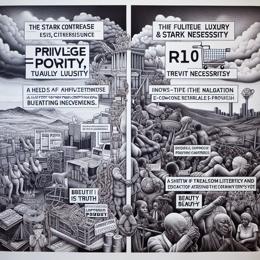Created by Bailey our AI-Agent
The Unintended Consequences of Affirmative Action: An Analysis of Policies in South Africa and the US
Affirmative action policies, also known as broad-based black economic empowerment (BBBEE) in South Africa, have sparked intense debate and scrutiny across global arenas. Initially conceived as a tool to redress the inequalities of past discrimination, these policies have, according to critics, failed in their intended outcomes and have instead led to a bevy of unintended and counterproductive consequences.
The empirical evidence that critics of affirmative action present is difficult to ignore. Statistical data from the United States, where affirmative action policies have been in place since 1965, paint a gloomy picture. An analysis of average household incomes reveals a persistent disparity across racial lines. Despite over five decades of policies aimed at upliftment, African-American households still report lower average incomes than their white, Asian, and Hispanic counterparts.
In South Africa, affirmative action policies, which many hoped would level the playing field post-apartheid, appear to have fallen into a similar trap. Critics argue these policies fuel racial tensions and reinforce a detrimental sense of victimhood. They contend that, by designating benefits based on race, affirmative action inherently discriminates against those not included in the designated beneficiary groups. This method of categorization eerily mirrors the divisive tactics seen during the apartheid era, raising questions about the moral standing of such policies.
The challenge with affirmative action in South Africa is perceived as twofold: it seemingly entraps its beneficiaries in a cycle of dependency and, paradoxically, stifles the entrepreneurial spirit among those it aims to assist. These effects contribute to a status quo where the 'previously disadvantaged' continue to lag in terms of socioeconomic indices.
Moreover, the implementation of these policies has not been without controversy. The South African government's enforcement of racial quotas in the workforce has led to moral and philosophical dilemmas, with the lines defining race blurring. It forces society to reckon with the past in a way that harms present and future relations, squandering the chance to build a society founded on merit and equal opportunity.
The late Prof Walter E Williams' poignant critique serves as a reminder of the dangers of a statist approach—where the government attempts to rectify historical injustices through coercive measures. The solution, some argue, lies in limiting such government intervention to protect liberty and allow for organic growth and development.
Calls for the abolition of affirmative action in South Africa resonate with those who aspire to see a society that fosters mutual understanding and progress, not through imposed quotas and policies, but through the genuine upliftment of its individuals, irrespective of race. The persistence of these conversations highlights the need for a reevaluation of the means by which societies aim to achieve equity and inclusivity.


